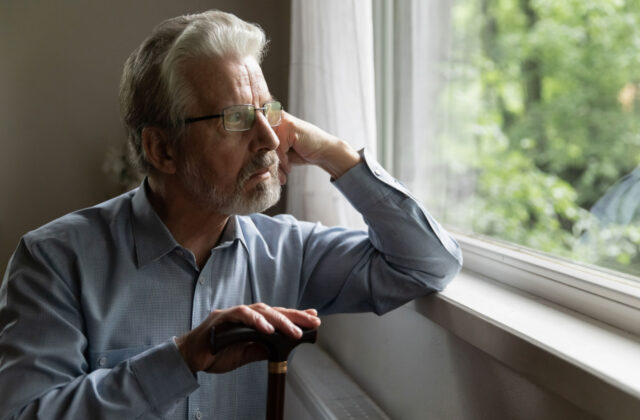As our loved ones age, they often experience age-related mental and physical changes that may require additional care. Changes in behavior can include the development of hallucinations.
Hallucinations in older adults can be perplexing both for the individuals affected and their loved ones. While often associated with conditions such as schizophrenia, hallucinations can also occur from medication side effects, cognitive decline, hearing loss, vision loss, sleep disorders, mental health concerns, or Charles Bonnet Syndrome.
With compassionate care and personalized support to manage these challenging symptoms, your loved ones can maintain the quality of life they deserve.
What Are Hallucinations?
Hallucinations are perceptual experiences that occur in the absence of external stimuli. In simpler terms, they involve seeing, hearing, feeling, or sensing something that others around you do not.
Hallucinations can affect any of the 5 senses, but visual and auditory hallucinations are the most commonly reported. These sensory experiences feel real to the person experiencing them, often making it challenging to distinguish between what is physically there and what is a product of the mind.
Hallucinations can be vivid and detailed, ranging from seeing people or objects that aren’t there to hearing voices or sounds that others can’t perceive.
Hallucinations can occur with accompanying symptoms, such as:
- Unusual beliefs
- Depression or anxiety
- Visual or hearing problems
- Paranoia or aggressive behavior
- Belief in conspiracies
- Seizures
- Headaches
Types of Hallucinations
There are various types of hallucinations, including:
- Auditory hallucinations—when you hear something that’s not there
- Visual hallucinations—when you see something that’s not real
- Olfactory hallucinations—when you smell something that’s not there
- Gustatory hallucinations—when you taste something you didn’t eat
- Tactile hallucinations—when you feel like something or someone touched you
- Somatic hallucinations—unreal sensations affecting the entire body
Causes of Hallucinations in Older Adults
While hallucinations can occur in anyone, they’re common in older adults. There are several causes of hallucinations in older adults, and understanding the underlying cause can help in providing loved ones with the care needed.
Medications & Hallucinations
Certain drugs can have unpleasant side effects related to hallucinations. These can include drugs that treat high blood pressure and disorders such as Parkinson’s disease. Some antibiotics can also cause hallucinations.
Cognitive Decline & Hallucinations
Cognitive decline, particularly in the context of dementia and Alzheimer’s disease, is a significant factor contributing to hallucinations in older adults. As these conditions progress, changes in the brain can affect perception and reality processing.
Individuals with dementia may experience visual or auditory hallucinations, such as seeing a familiar face in a curtain, insects crawling on their hands, hearing someone talking, or conversing with an imaginary person.
Hearing Loss, Vision Loss, & Hallucinations
Hearing and vision issues that commonly affect older adults, such as otosclerosis and glaucoma, can increase the risk of hyperactivity in the brain and cause hallucinations.
Sleep Disorders & Hallucinations
Long periods of sleep loss can have negative impacts on health. Sleep disturbances can contribute to cognitive difficulties. Schizophrenia and bipolar disorder studies show that sleep problems are associated with auditory hallucinations and delusions.
Charles Bonnet Syndrome & Hallucinations
Charles Bonnet Syndrome is a condition that occurs in individuals with partial or severe blindness that causes them to have visual hallucinations. Because of vision loss, the brain creates images or recalls images that aren’t there in reality.
Mental Health & Hallucinations
People of any age can be susceptible to hallucinations in the presence of heightened anxiety and depression. Life changes, loss of loved ones, or health concerns can contribute to increased psychological distress or emotions, potentially triggering hallucinatory experiences.
Dehydration & Hallucinations
Dehydration can be a common issue in older adults. The body may lose more water than it takes in due to not drinking enough fluids, medications, or kidney problems. In some cases, inadequate water in the body can cause malfunctioning of the brain and lead to hallucinations.
Illness & Hallucinations
The accumulation of toxins in liver failure and kidney failure affects the brain and can cause hallucinations. Brain cancer can also cause serious hallucinations.
When to See a Healthcare Professional
If your loved one is experiencing hallucinations, there are several things you can do to help them manage their symptoms. First and foremost, be patient and understanding, and do not leave them alone. Contact a healthcare provider to determine the underlying cause of the hallucinations and recommend the appropriate action.
Support & Care for Loved Ones
While hallucinations can be a challenging symptom for older adults and their families to navigate, working closely with your loved one’s doctor and providing compassionate support can help manage their symptoms and improve their quality of life.
Regular medication reviews, attentive management of mental health, and a focus on cognitive well-being contribute to a comprehensive care strategy for older adults experiencing hallucinations. Reach out to Del Corazon Hospice to learn how we can support your loved one through short or long-term care specific to their needs.



